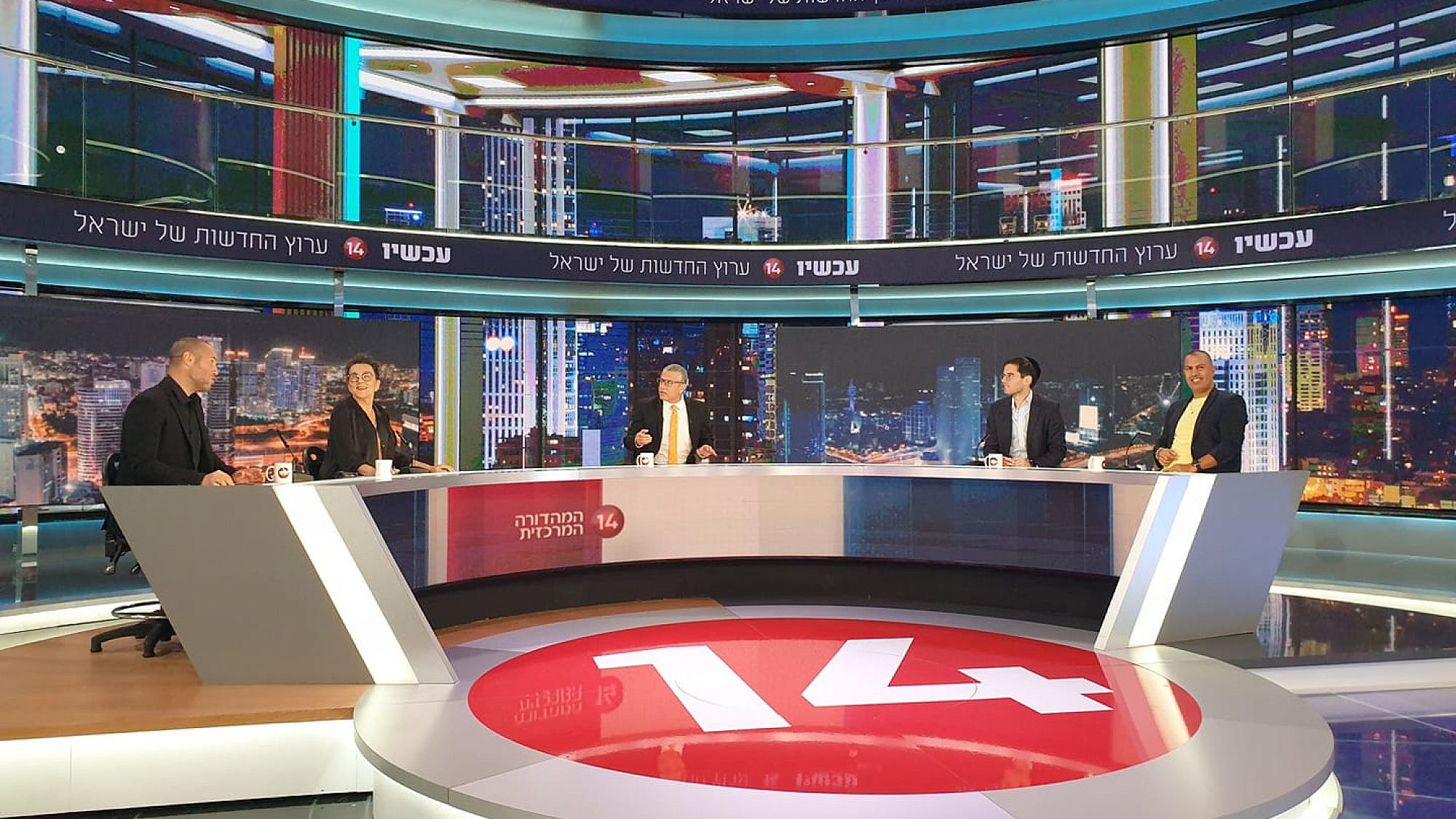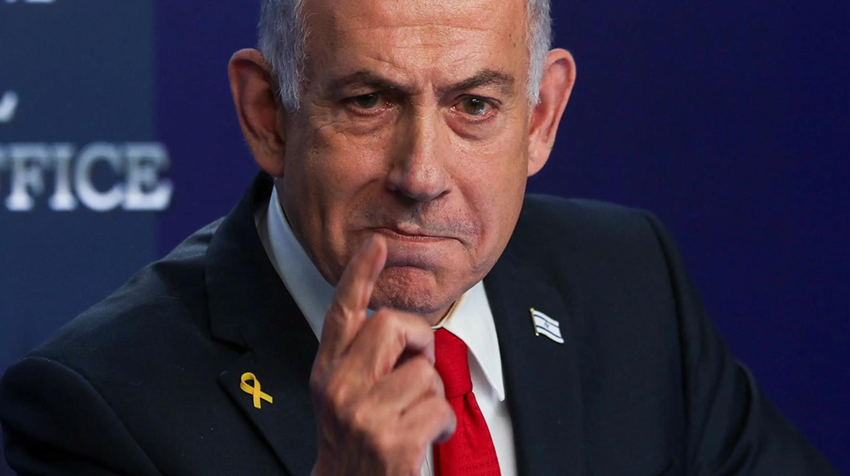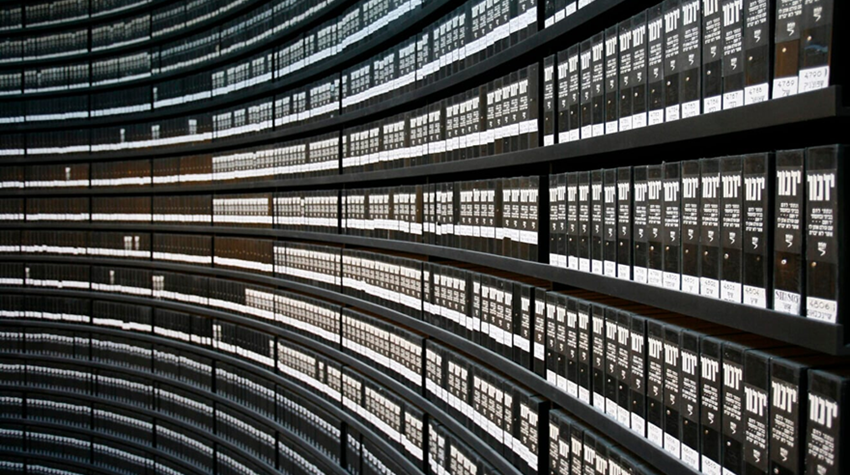Israel's Channel 14 program "The Patriots," hosted by Yinon Magal. (center). Source: Facebook.
The Israel Competition Authority confirmed to JNS that it received a request from Channel 14, Israel’s only conservative television station with a news department, to investigate possible illegal coordination by major Israeli businesses to drop the station from their advertising budgets in an effort to shutter it.
Several companies have banded together to “break the channel financially” because they disapprove of its political positions, the station’s owners said, calling it an assault on free speech.
In a letter to the station’s employees this week, Netanel Siman Tov, a representative of the station’s owners, wrote: “A phenomenon in which capitalists use economic terror to limit freedom of expression and impose a political agenda on journalists belongs to dark regimes. It has no place in a democracy, of which a free press is its lifeblood.”
“It’s our intention to use all the legal tools at our disposal to bring justice to everyone who was involved in the attempted cancellation of the channel,” Siman Tov added.
The catalyst for the boycott was controversial remarks made on July 30 by guest panelist Ari Shamai on the channel’s popular “The Patriots” program. Shamai said that the assassin who murdered Israeli Prime Minister Yitzhak Rabin in 1995 should be freed from prison.
Although the station swiftly banned Shamai, announcing 45 minutes after the program aired that “in light of the seriousness of the matter, Mr. Shamai will no longer be invited to appear on the channel’s programs,” Israeli food and beverage company Strauss Group announced the next day it was pulling its ads from the station.
In justifying its decision, Strauss said that the pundit’s statement was one of “various offensive statements, repeated over and over again, recently in the programs broadcast on the channel.”
Troublesome affiliation
Asaf Nissan, deputy editor of Channel 14’s “Evening News,” told JNS, “They were looking for an excuse to cut ties with the channel. The affiliation has been troublesome for them.”
Other brands followed Strauss, including subsidiary Strauss Water Ltd., which sells mini-water bars under the Tami 4 brand, Delek Motors, which imports Mazda, BMW and Ford cars, and Caesarstone, a maker of quartz kitchen surfaces.
Channel 14 said the three companies conspired together.
“The Competition Authority absolutely should investigate,” Professor Yaron Zelekha, director of Accountancy Studies at Ono Academic College and former accountant general of Israel, told JNS, adding that the companies are engaging in an illegal act.
“Any company has the right to advertise where it likes, but it can’t coordinate a ban,” he said. “That’s forbidden under subsection (a)(3) of Israel’s Economic Competition Law, which says you can’t divide up a market. Here, it’s the television advertising market.
“If you are Strauss, or Bank Hapoalim, or another big player with significant market power in the procurement of television advertising services, coordination is prohibited. It’s a cartel,” Zelekha said.
A smoking gun?
A Channel 14 report points to a leaked chat from a “Business Forum” WhatsApp group as a possible smoking gun. The group’s members include major Israeli business owners in Israel.
Hay Galis, deputy CEO of Big Group, wrote in the chat to Shai Babad, CEO and president of Strauss, “Well done. Be strong and courageous. You must not put a shekel on this horrible channel that poisons the State of Israel. The target audience can be found in other media. You must not put a worn agorah [penny] on them.”
Eitan Bar Zeev, chairman of the board of Big Shopping Centers, also wrote to Babad: “Shai, you are not alone. I believe that none of the members of the forum will invest a shekel in this polluted channel. A bunch of instigators whose day will come.”
Eyal Waldman, co-founder of Mellanox Technologies, said, “The banks should also stop advertising on 14 if they can.” Gil Agmon, director and CEO of Delek Automotive Systems, asked Waldman to “consider things carefully,” presumably fearing the conversation would be leaked, Channel 14 reported.
“Everyone in the forum should express a similar position. We will crush them from the economic side so that Bibi’s [Prime Minister Benjamin Netanyahu’s] oligarch must finance this poison himself,” Galis then said, apparently referring to Channel 14’s controlling shareholder, Yitzchak Mirilashvili.
Siman Tov suggested that by exposing the boycott the channel has thwarted it: “Had we not exposed this criminal organizing, and the boycott of the advertisers would have come into effect, that would have been the end of Channel 14.”
However, Israeli news site Walla reports that a “silent boycott” may have been going on for months, citing a report by Ifat Media Information, a business data analysis company.
Ifat’s report showed “selective advertising” by a host of major companies. While they spent millions on television ads in July, zero of that ad money went to Channel 14. Companies included Procter & Gamble, L’Oreal, Sano, Isracard, Tnuva and Teva Pharmaceuticals.
Siman Tov said that the CEOs are taking their marching orders from opposition politicians, specifically naming Yesh Atid Party leader Yair Lapid and Labor Party head Merav Michaeli. In September 2022, then-Prime Minister Lapid’s party petitioned the Central Elections Committee to recategorize Channel 14 as a political organization, accusing it of being wholly in Likud’s camp.
Michaeli repeated the charge on public broadcaster Channel 11 last week, saying: “The propaganda, lie and incitement machine mistakenly called ‘Channel 14‘ simply needs to be shut down. It is an arm in the service of the government, a toxic hotbed that sows division and incitement. This is certainly not journalism and it has no right to freedom of expression.”
“For months we’ve been watching the left block roads, lay down barb wire, pursue government ministers even when they’re on vacation, like they did this week to Netanyahu,” Nissan told JNS. “If anyone tries to impose limits on them, they shout freedom of speech. But when a solitary channel goes against their party line, that’s suddenly beyond the pale. It’s rank hypocrisy.”
“The Israeli left could be the topic of a psychology course on cognitive dissonance,” he added.
Nissan said Channel 14 is being selectively targeted, noting that if Strauss was really concerned about “offensive remarks,” its owners would have pulled their advertising from other channels. “In May, a Channel 12 host called the haredim ‘bloodsuckers.’ Strauss didn’t say a word,” he said.
Channel 14 isn’t calling for a boycott of the boycotters, (though several of the channel’s prominent hosts have done so). “It’s not an official policy of the channel,” Nissan said.
Nevertheless, a backlash has begun. Dozens of Orthodox Zionist rabbis, many of them heads of yeshivahs, declared on Aug. 3 that their institutions would no longer buy products from Strauss. They said Strauss’s boycott was not just against a TV channel but against a large portion of Israel’s public.
“Channel 14 is the only channel to balance all the other media channels, including the state media, all of them condemning with one blatantly biased voice in favor of the left and the opposition,” they said in an open letter.
“We cannot sit on the sidelines, and we have announced that from today our yeshivahs and educational institutions will not purchase products from companies that boycott publics in Israel, that harm freedom of expression and the unity of the people,” they wrote.
In an attempt at damage control, Strauss’s Babad wrote a letter, published widely in Hebrew media, saying that “the attempt to create a false representation that Strauss’s decision to freeze advertising on Channel 14 means a boycott against a certain public is not true.”
“We have never boycotted nor ever will boycott a public in Israel,” Babad wrote.
Source: David Isaac, JNS


































